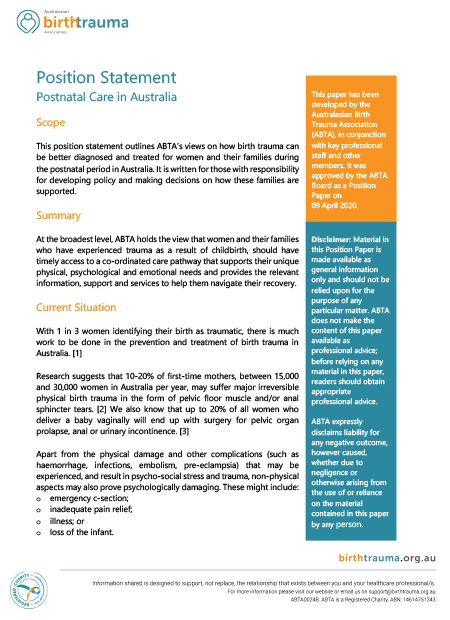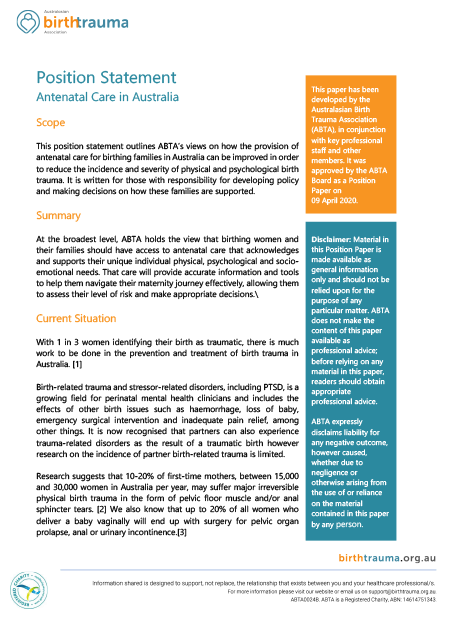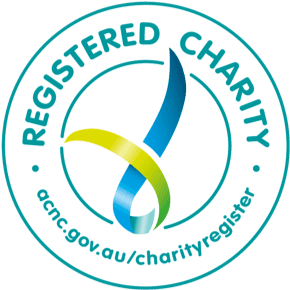BTA was founded in 2016, when Liz Skinner, a midwife, registered nurse, child and family clinician, lecturer, and researcher, was interviewing affected women for her PHD thesis on ‘The Psychological Impact of Somatic Trauma’. Amy Dawes discovered Liz’s work during her journey to process her own experience after the forceps delivery she had with her first child. Amy reached out to Liz, and a friendship was formed.
Shortly after meeting Amy, Liz visited the UK and met with the UK Birth Trauma Association. It was during this trip that Liz recognised the great need for women and their families to have support in Australia. Upon her return, she made this suggestion to Amy, and so, with initial funds donated by Professor Hans Peter Dietz, the Australasian Birth Trauma Association was founded. A board was formed, and in that same year, ABTA became a registered charity.
With a rebrand, ABTA now Birth Trauma Australia or BTA is reliant upon our board, our clinical advisors and the incredible volunteers who donate their time and expertise to enable us to continue educating and advocating for safer births and better healing.
We are the peak charity in Australia dedicated to supporting women, people, fathers, partners, and families after birth-related trauma. We listen to the voice of the consumer and respond to the unmet needs of birthing families. As a committed advocate for a multidisciplinary approach to maternity care, we actively collaborate with diverse health professional groups and highly value each group’s unique contribution and strong commitment to maternity care. Through these partnerships, we aim to enhance our services and provide comprehensive information support to birthing families.
Our Vision
BTA’s vision is safer births and better healing.
OUR MISSION
Our goals
Awareness
Education
Support
Sustainability
How we practice our values
Consumer-centered
We focus on the needs of the individual (see also: “Our language”).
Peer-led
Those with a lived/living experience of birth-related trauma shape all of our work.
Inclusive
We support birthing individuals and their families, recognising that families come in all shapes and sizes.
Compassionate
We care about those with lived experience and recognise the need to support parents and the workforce.
Empathetic
We want you to feel heard and your experience validated.
Respectful
We accept you for who you are and for your experience.
Collaborative
We know our purpose can only be achieved by working with diverse people and professions, each with essential strengths and contributions.
Our language
- people giving birth;
- fathers, partners, friends and family members witnessing loved ones giving birth; and
- other people witnessing a birth or providing care in relation to pregnancy and birth, including health professionals.
We seek to be inclusive. All are welcome to access our services and resources, regardless of their gender, sexual orientation, profession or the circumstances in which they have suffered birth-related trauma.
“Birth-related trauma” includes any injury or trauma, whether physical or psychological, sustained at any time in connection with pregnancy, labour or childbirth. This definition is intended to be broad.
Donate via PAYPAL Today
Related Links
Our goals
Awareness
Education
Support
Sustainability
our Values
We are:
- Consumer-centred.
- Compassionate
- Collaborative
- Peer-led
- Empathetic
Inclusive - Respectful

Postnatal care in Australia
Position Statement (PDF)

Antenatal care in Australia
Position Statement (PDF)
Position Statements
Position Statements have been prepared to provide an explanation of Birth Trauma Australia’s (BTA) views and values about topics directly related to supporting families impacted by birth-related trauma. These Position Statements have been informed by the collection of anecdotal evidence from families who have experienced trauma as a result of childbirth, as well as communication with health professionals and learnings from academic research. These Position Statements are living documents that will be updated occasionally to reflect new research, fresh understandings and changes in context.








